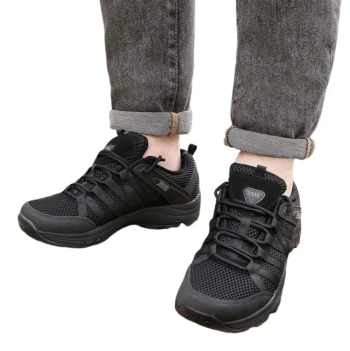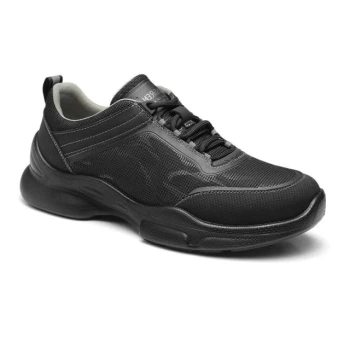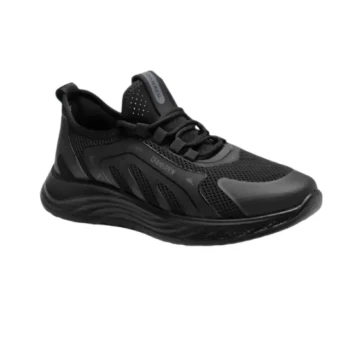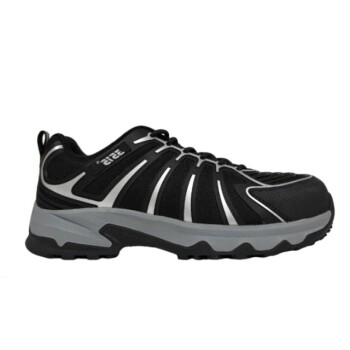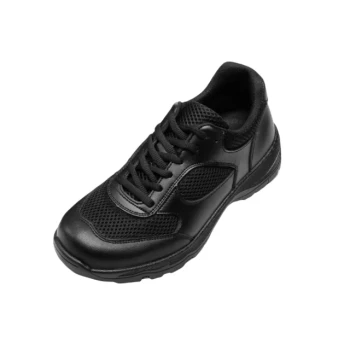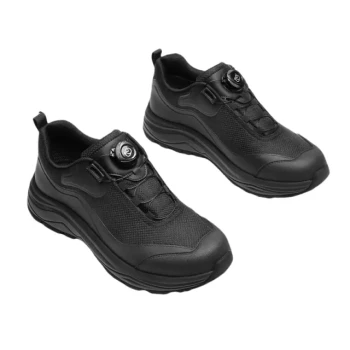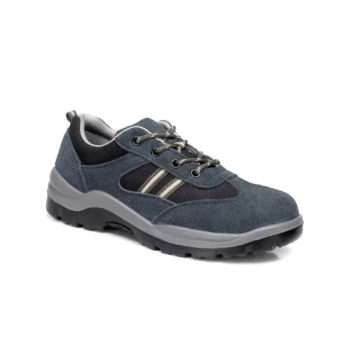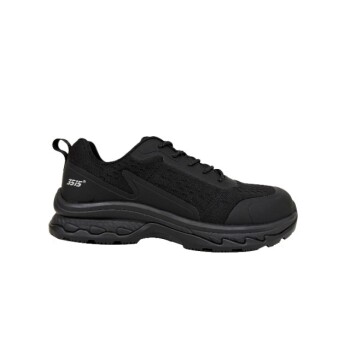At their core, sustainable shoes appeal to conscious consumers because they offer a tangible solution to the significant environmental and ethical problems embedded in the traditional footwear industry. These products align with a desire for accountability, utilizing recycled materials and cleaner production methods to reduce harm and address climate change concerns.
The appeal of sustainable footwear is less about the product itself and more about the principles it represents. It’s a vote against waste and harmful manufacturing, and a vote for a more responsible model of consumption.
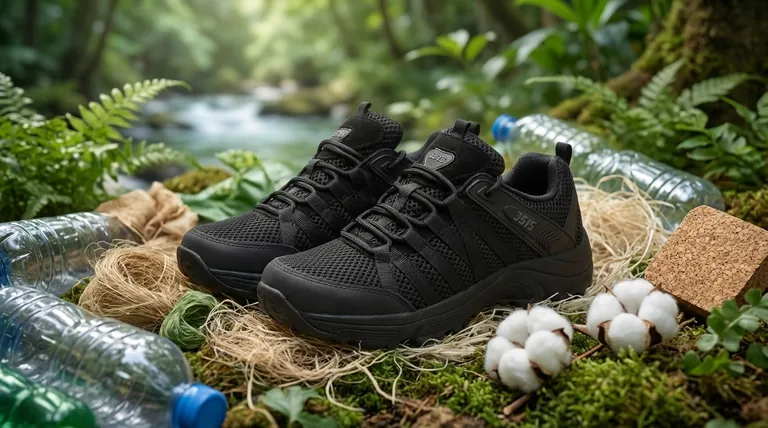
The Problem with Conventional Footwear
To understand the appeal of sustainable options, we must first recognize the issues conscious consumers are reacting against. The standard footwear industry has a long history of practices that are detrimental to the planet and its people.
The Massive Carbon Footprint
Traditional shoe manufacturing is incredibly energy-intensive. From the extraction of raw materials like petroleum for plastics and synthetics to the power required for factory production, the process releases significant amounts of CO2.
The Reliance on Harmful Materials
Most conventional shoes are made from virgin plastics, synthetic rubbers, and leathers tanned with toxic chemicals like chromium. These materials do not biodegrade, contributing to landfill waste for centuries.
The Issue of Waste
The complex construction of a typical sneaker, often involving dozens of different materials glued together, makes it nearly impossible to disassemble and recycle. This linear "take-make-waste" model is a primary target for change.
How Sustainable Shoes Offer a Solution
Sustainable footwear brands address these problems head-on by rethinking every stage of a shoe's life, from its creation to its disposal. This comprehensive approach is what resonates deeply with informed buyers.
Prioritizing Eco-Friendly Materials
The most visible change is the shift in materials. Brands now use recycled plastics (like PET from water bottles), plant-based materials (such as cork, algae foam, and pineapple leather), and natural fibers like organic cotton and hemp.
These choices directly reduce the reliance on virgin, petroleum-based resources and divert waste from landfills.
Reimagining the Production Process
Beyond materials, sustainable brands focus on eco-friendly production. This includes using less water, reducing chemical usage, and powering facilities with renewable energy.
This commitment to a cleaner process minimizes the pollution and carbon emissions associated with manufacturing.
Designing for Longevity and End-of-Life
A key principle of sustainability is moving away from disposable culture. Many sustainable shoes are designed for durability and repairability, extending their usable life.
Furthermore, some brands are designing for circularity, creating shoes that can be more easily disassembled or are made from biodegradable materials.
Understanding the Trade-offs
Choosing a sustainable path involves navigating a complex landscape. Objectivity requires acknowledging that "sustainable" is not a simple label and comes with its own set of challenges.
The Pitfall of "Greenwashing"
The term "sustainable" is not regulated, leading some companies to make misleading claims. Conscious consumers must look past marketing and seek brands that offer genuine transparency about their supply chain and materials.
Balancing Performance and Eco-Materials
Historically, some eco-friendly materials struggled to match the durability and performance of their synthetic counterparts, especially in high-performance athletic footwear. However, material science is rapidly closing this gap.
The Factor of Cost
Sustainable practices, such as paying fair wages and using innovative, small-batch materials, can result in a higher price point. For consumers, this is often framed as a long-term investment in a better product and a healthier planet.
Making an Informed Choice for Your Values
Your personal motivation for choosing sustainable shoes will guide your purchasing decisions.
- If your primary focus is reducing plastic waste: Seek out shoes made from recycled PET, reclaimed ocean plastics, and other upcycled materials.
- If your primary focus is climate impact: Prioritize shoes made with natural, plant-based materials like hemp or algae foam, which have a lower carbon footprint.
- If your primary focus is ethical production: Look for brands that are transparent about their factory locations and hold certifications like Fair Trade.
Ultimately, choosing sustainable footwear is an intentional act that reflects a commitment to a more responsible future.
Summary Table:
| Key Appeal Factor | How It's Achieved |
|---|---|
| Reduces Environmental Harm | Uses recycled plastics, plant-based materials, and cleaner production. |
| Addresses Ethical Concerns | Focuses on fair labor practices and supply chain transparency. |
| Promotes Circular Economy | Designs for durability, repairability, and end-of-life recyclability. |
Ready to source high-quality, sustainable footwear?
As a large-scale manufacturer, 3515 produces a comprehensive range of eco-conscious shoes and boots for distributors, brand owners, and bulk clients. We help you meet the growing demand for responsible products with our advanced production capabilities.
Contact us today to discuss your sustainable footwear needs and explore our catalog.
Visual Guide
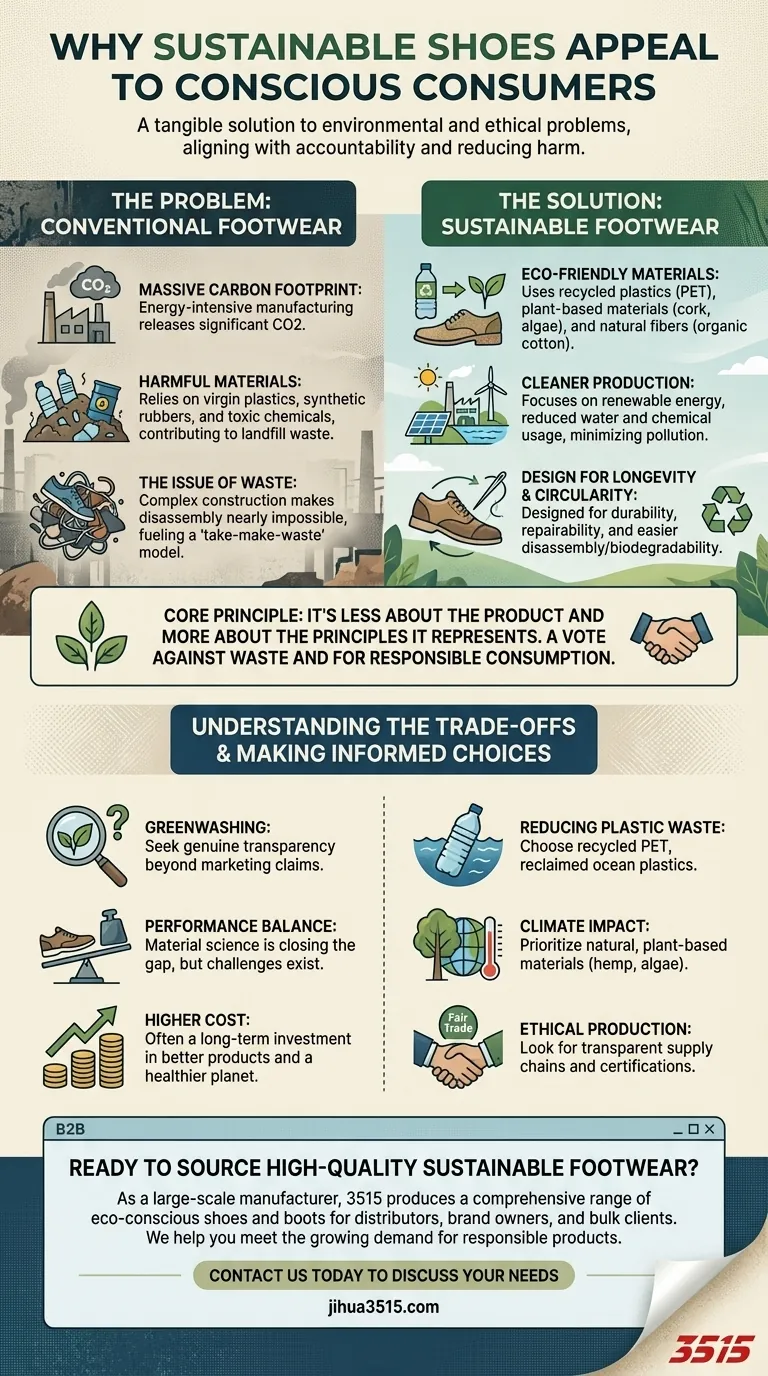
Related Products
- Lightweight Breathable Training Shoes for Wholesale & Custom OEM Manufacturing
- Wholesale Breathable Training Shoes Custom Athletic Footwear Manufacturer
- Wholesale Breathable & Cushioned Training Shoes Custom Factory Production
- Premium KPU Athletic Safety Shoes for Wholesale
- Durable Rubber-Soled Utility Shoes for Wholesale & Custom Brand Manufacturing
People Also Ask
- Does more ground contact area mean better support? Unlock the Secrets of Stable Footwear
- Does exercising with a friend or partner enhance safety? Unlock the 'Buddy System' Benefits
- How do athletic shoes with non-slip features differ from regular ones? Discover the Grip Advantage
- How do non-slip athletic shoes differ from regular athletic shoes? Discover the Grip Technology
- What is high-tech 'air' mesh, and how is it used in footwear? The Key to Cool, Lightweight Shoes
